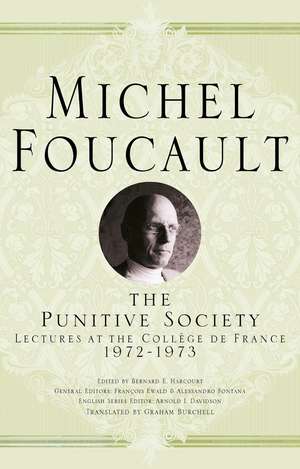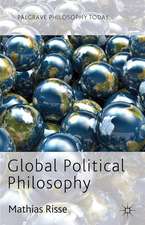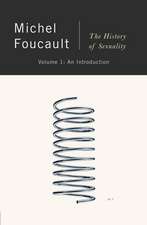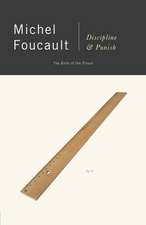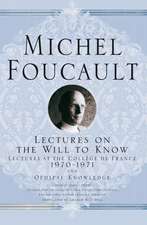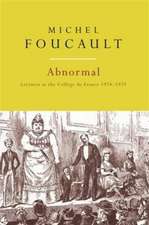The Punitive Society: Lectures at the Collège de France, 1972-1973: Michel Foucault, Lectures at the Collège de France
Autor Michel Foucault Editat de Arnold I. Davidson Traducere de Graham Burchellen Limba Engleză Hardback – 28 sep 2015
| Toate formatele și edițiile | Preț | Express |
|---|---|---|
| Paperback (1) | 117.95 lei 3-5 săpt. | |
| Picador Paper – 7 aug 2018 | 117.95 lei 3-5 săpt. | |
| Hardback (1) | 396.40 lei 6-8 săpt. | |
| Palgrave Macmillan UK – 28 sep 2015 | 396.40 lei 6-8 săpt. |
Preț: 396.40 lei
Nou
Puncte Express: 595
Preț estimativ în valută:
75.86€ • 78.26$ • 64.20£
75.86€ • 78.26$ • 64.20£
Carte tipărită la comandă
Livrare economică 05-19 martie
Preluare comenzi: 021 569.72.76
Specificații
ISBN-13: 9781403986603
ISBN-10: 1403986606
Pagini: 340
Ilustrații: XIX, 320 p.
Dimensiuni: 140 x 216 x 28 mm
Greutate: 0.61 kg
Ediția:1st ed. 2015
Editura: Palgrave Macmillan UK
Colecția Palgrave Macmillan
Seria Michel Foucault, Lectures at the Collège de France
Locul publicării:London, United Kingdom
ISBN-10: 1403986606
Pagini: 340
Ilustrații: XIX, 320 p.
Dimensiuni: 140 x 216 x 28 mm
Greutate: 0.61 kg
Ediția:1st ed. 2015
Editura: Palgrave Macmillan UK
Colecția Palgrave Macmillan
Seria Michel Foucault, Lectures at the Collège de France
Locul publicării:London, United Kingdom
Cuprins
Foreword: François Ewald And Alessandro Fontana
Introduction: Arnold I. Davidson
Translator's Note
1. 3 January 1973
2. 10 January 1973
3. 17 January 1973
4. 24 January 1973
5. 31 January 1973
6. 7 February 1973
7. 14 February 1973
8. 21 February 1973
9. 28 February 1973
10. 7 March 1973
11. 14 March 1973
12. 21 March 1973
13. 28 March 1973
Course Summary
Course Context
Index Of Notions
Index Of Names
Introduction: Arnold I. Davidson
Translator's Note
1. 3 January 1973
2. 10 January 1973
3. 17 January 1973
4. 24 January 1973
5. 31 January 1973
6. 7 February 1973
7. 14 February 1973
8. 21 February 1973
9. 28 February 1973
10. 7 March 1973
11. 14 March 1973
12. 21 March 1973
13. 28 March 1973
Course Summary
Course Context
Index Of Notions
Index Of Names
Recenzii
Selected by Choice magazine as an "Outstanding Academic Title" for 2016
“Delivered shortly after the dissolution of Group d’Information sur les Prisons, Foucault’s third lecture course at the Collège de France coincided with a significant change in his thinking about prisons, as he began to reflect on the disciplinary power at work in prisons and in society more generally. … Summing Up: Essential. Lower-division undergraduates through faculty; general readers.” (A. D. Schrift, Choice, Vol. 53 (9), May, 2016)
“Bernard Harcourt … has done a fantastic job establishing the text of the lectures … . He provides us with countless erudite references to Foucault’s unacknowledged as well as acknowledged sources and supplies a clear, fair-minded and modest commentary. The editors of the series and Harcourt’s research assistants also need our thanks as well. But in the end, it is Graham Burchell’s superb translation and Harcourt’s absolutely rigorous editing work … that ought toreceive our everlasting thanks.” (Mariana Valverdem, British Journal of Criminology, Vol. 57 (1), January, 2017)
“[Foucault] must be reckoned with.” (The New York Times Book Review)
“Ideas spark off nearly every page of this book, as Foucault manages to reinvigorate questions of power and violence that might have seemed well-worn. The words may have been spoken in 1976, but they seem as alive and relevant as if they had been written yesterday.” (Bookforum)
“Foucault is quite central to our sense of where we are.” (The Nation)
“[Foucault] has an alert and sensitive mind that can ignore the familiar surfaces of established intellectual coded and ask new questions [He] gives dramatic quality to the movement of culture.” (The New York Review of Books)
“These lectures offer important insights into the evolution of the primary focus of Foucault's later work the relationship between power and knowledge.” (Library Journal)
“Delivered shortly after the dissolution of Group d’Information sur les Prisons, Foucault’s third lecture course at the Collège de France coincided with a significant change in his thinking about prisons, as he began to reflect on the disciplinary power at work in prisons and in society more generally. … Summing Up: Essential. Lower-division undergraduates through faculty; general readers.” (A. D. Schrift, Choice, Vol. 53 (9), May, 2016)
“Bernard Harcourt … has done a fantastic job establishing the text of the lectures … . He provides us with countless erudite references to Foucault’s unacknowledged as well as acknowledged sources and supplies a clear, fair-minded and modest commentary. The editors of the series and Harcourt’s research assistants also need our thanks as well. But in the end, it is Graham Burchell’s superb translation and Harcourt’s absolutely rigorous editing work … that ought toreceive our everlasting thanks.” (Mariana Valverdem, British Journal of Criminology, Vol. 57 (1), January, 2017)
“[Foucault] must be reckoned with.” (The New York Times Book Review)
“Ideas spark off nearly every page of this book, as Foucault manages to reinvigorate questions of power and violence that might have seemed well-worn. The words may have been spoken in 1976, but they seem as alive and relevant as if they had been written yesterday.” (Bookforum)
“Foucault is quite central to our sense of where we are.” (The Nation)
“[Foucault] has an alert and sensitive mind that can ignore the familiar surfaces of established intellectual coded and ask new questions [He] gives dramatic quality to the movement of culture.” (The New York Review of Books)
“These lectures offer important insights into the evolution of the primary focus of Foucault's later work the relationship between power and knowledge.” (Library Journal)
Notă biografică
Author Michel Foucault: Michel Foucault, acknowledged as the pre-eminent philosopher of France in the 1970s and 1980s, continues to have enormous impact throughout the world in many disciplines.
Caracteristici
Indispensable for understanding the nature and unity of Foucault's overall project Examines how the relations between justice and truth that govern modern penal law were forged Brings together previously unpublished historical material concerning classical political economy, the Quakers, English 'Dissenters,' and their philanthropy Invaluable not only for students of Foucault's work, but also all students of political philosophy One of the greatest texts recounting the history of capitalism
